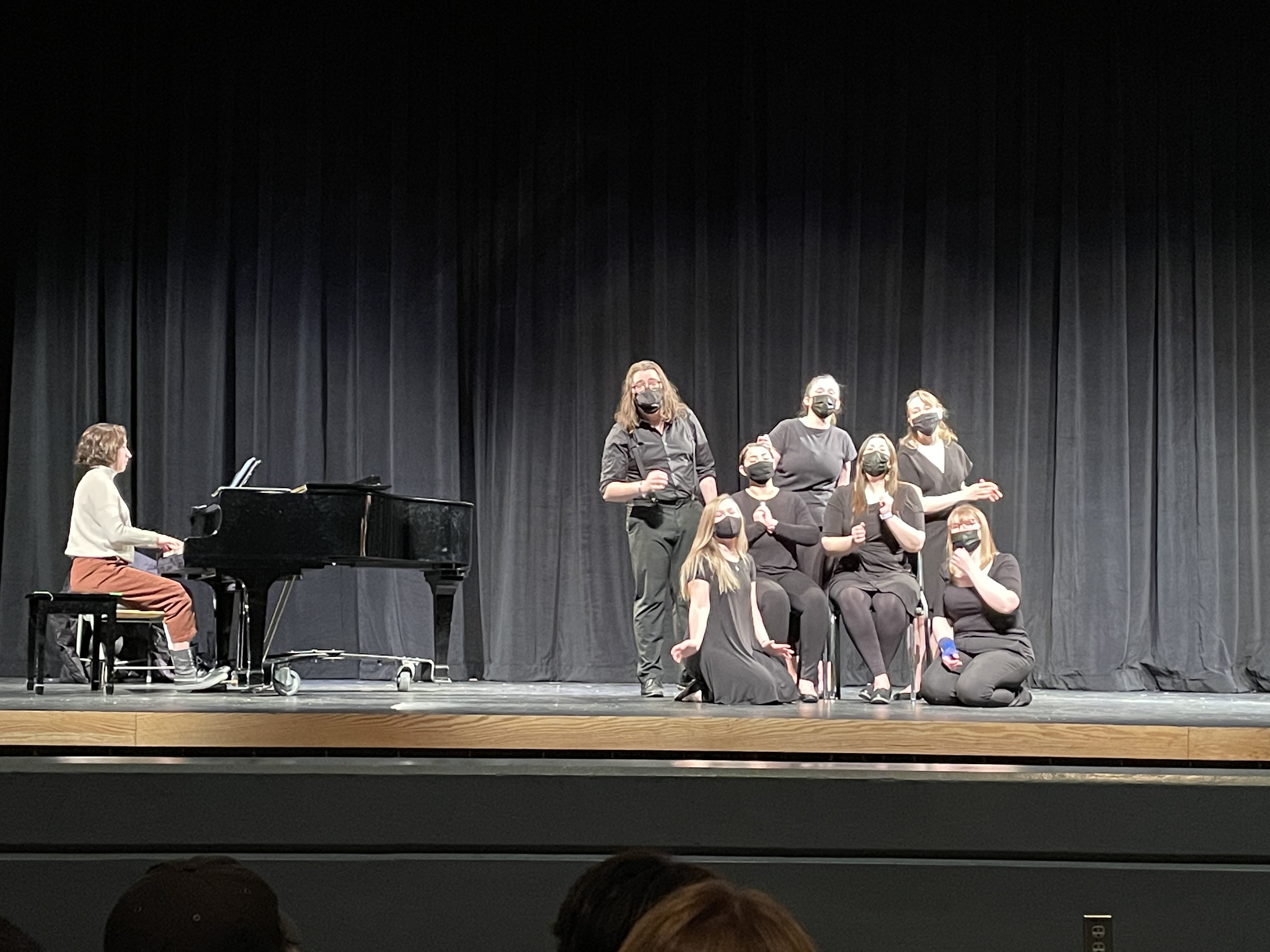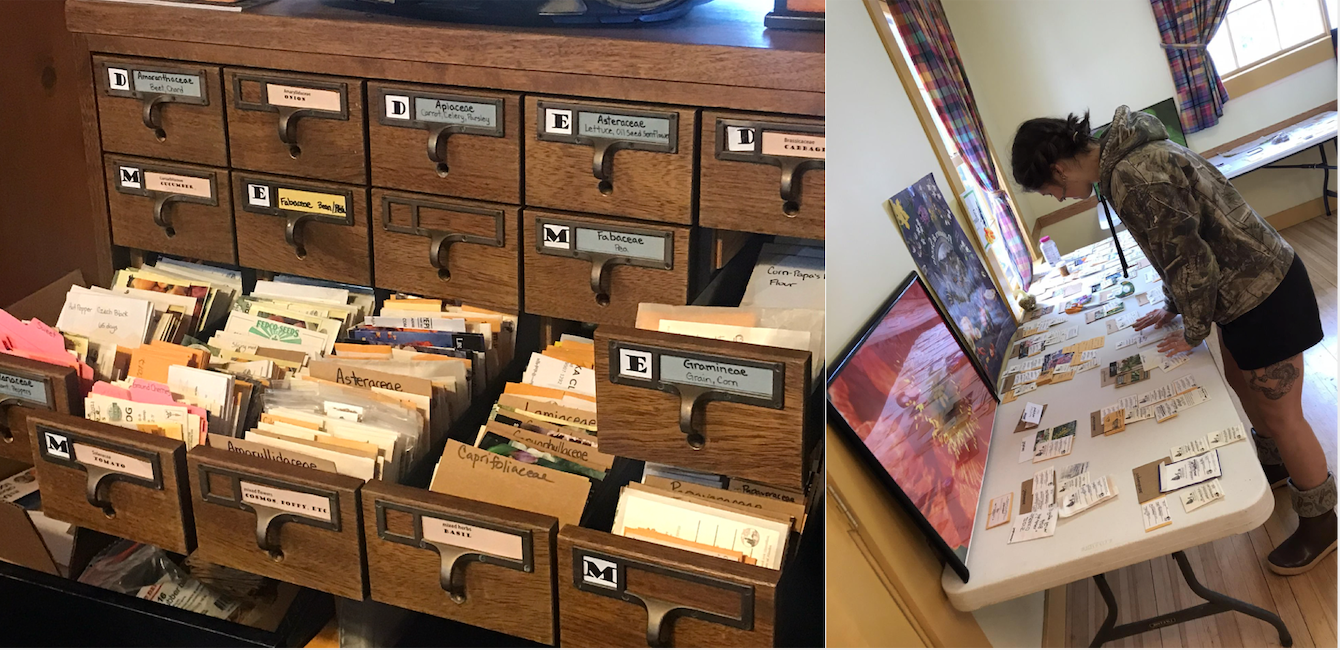Community-Engaged Learning Awards
Application Schedule
-
JULY 31
Applications Close September 10 at 11:59pm -
OCT 2
-
JUNE 30
Undergraduate students, graduate students, researchers, staff and faculty from all UAF-affiliated campuses are invited to apply for an URSA Community-Engaged Learning (CEL) Award of up to $5,000.
This award is an opportunity for undergraduate students to work with a community partner to explore a community need or problem through research or scholarly activity. Awarded proposals will clearly describe a project with a desire to collaborate with a community partner (leader, organization, or population) who is willing to support undergraduate student involvement.

Poster from the Justice Department at URSA's Research and Creative Activity Day.

Benjamin Anderson, Madeline Andriesen, Grace Farrell, Ellie Martinson, Mari Ana Beks, Ariana Lopez, Taylor Hendricks, & Arianna Carroll
Mentor: Jaunelle Celaire
During the 2021-2022 school year, the University of Alaska Fairbanks Opera Workshop program received CEL funding to complete an outreach opportunity with a collection of Musical Theater and Operetta pieces for local Elementary, Middle, and High Schools. where support for local music programs are being drastically reduced.
"URSA has helped me reach goals through their funding and ongoing support. We were able to reach out into a community of younger students, and a community of educators, in an effort to make connections and to share our art. That is always the goal of us as performers and to have had that chance is in itself, wonderful." - Grace Farrell

Mel Durrett
Institute of Arctic Biology (IAB)
Students: Lillian Nelson & Ashlyn Squier
Alaska’s food security has been an ongoing challenge since the days of Russian America, yet the agricultural industry in the United States has little reason to develop plant varieties specifically for Alaska. Heirloom varieties of vegetables, fruits, and flowers are a significant source of agricultural diversity and may be bred by local gardeners into Alaska-hardy strains, because anyone can save their seeds and replant them. A “seed library” is where a stock of seeds is “loaned” to local gardeners to be grown in local conditions. Ideally, after harvest, gardeners save some seed from their bounty to “return” to the library. A seed library grows over time, in the number of seed stewards using seed as well as the abundance and variety of seeds available. A healthy local seed library can safeguard local agricultural biodiversity and give gardeners more control over local food production (aka food sovereignty).
General Eligibility:
- Degree-seeking UAF undergraduate students, graduate students, faculty, postdoctoral researchers, and staff from all disciplines and UAF campuses are eligible to apply. Regardless of applicant status, the project must support undergraduate learning.
- UAF Campuses Include: Bristol Bay, Chukchi, CTC, Troth Yeddha’, Interior Alaska, Kuskokwim, Northwest.
- Applicants may only submit one proposal for each request for proposal (RFP).
- CEL student awardees may participate each year.
- CEL mentor awardees may only receive URSA Community Engaged Learning awards two out of every three years.
Student Eligibility:
- Must be a Degree-seeking undergraduate student
Students of any year of study, from any UAF-affiliated campus, working toward an Occupational Endorsement, Certificate, Associate's Degree or Bachelor's Degree in any discipline are eligible to apply for and participate in CEL projects. Middle College students, graduated undergraduate students and graduate students are not eligible to apply. - Registration:
- Students must be enrolled in at least 3 credits at any UAF-affiliated campus for the funded award term.
- GPA of 2.3 or higher
Students with a GPA lower than 2.3 are not eligible. - Students that have received full funding from another UAF program for the same project are not eligible for additional funding from URSA (for example BLaST, INBRE, EPSCOR, Alaska Space Grant Program, amongst others) .
Mentor Eligibility:
- Faculty, post-doctoral researchers, graduate students, and staff may serve as URSA mentors and apply for the CEL award.
- Mentors must confirm their participation via the URSA Mentor Confirmation form prior to the application deadline.
- Mentor applicants must have at least one eligible undergraduate project participant identified prior to awarding.
- Awardees must complete a Reflection Form by the end of the award period. Groups need only to complete one joint reflection.
- Final products to be submitted (by the applicant) with the reflection form include:
- A poster representing your project (completed by the students involved)
- 2-3 high resolution pictures (one of which features the students/s, mentor, and community partner working together)
- Complete one approved outreach activity (**The awardee's outreach choice must be discussed with and confirmed by the URSA Coordinator
prior to completion.) :
- Create an URSA Outreach Video for YouTube (2-3 minutes).
- Create a Poster Presentation Video for YouTube (2-3 minutes).
- Complete a mid-award blog post/ student spotlight for the URSA website (Q & A format).
- Provide 2 mid-award photos and updates for URSA's Social Media pages (Facebook & Instagram).
- Attend an URSA Event as a Student Ambassador (Event Example: URSA RFP Open House, URSA Seminars, UAF Tabling Event, etc.).
- Host an event related to your project (i.e. public presentation, art exhibition, public performance, workshop, tour of project site for prospective students, etc.)
- Regardless of the applicant, students involved in an awarded project must present their project results at URSA's Research & Creative Activity Day in April of that academic year.
IMPORTANT: Failure to submit a final evaluation, to submit final products, or to participate in Research & Creative Activity Day will make the student ineligible to receive future URSA funding.
-
FELLOWSHIPS
-
Fellowship payments may be used to pay the awarded student a stipend.
-
Students must be degree-seeking and registered for per the award eligibility requirements.
-
Fellowships are paid by UA direct deposit. The fellowship is taxable and students will be responsible for payment of any taxes owed.
-
For those currently holding campus employment: In order to receive a fellowship, campus employment tasks and URSA Project tasks must not overlap. Fellowship eligibility will be determined by a final HR review of the student employment and URSA Project descriptions. If you have concerns, please contact the URSA Office.
-
-
TUITION
To cover up to 4 credits maximum UAF registration costs for courses directly related to the funded project (course fees not included). -
SUPPLIES/SERVICES
To support the purchase of supplies for the undergraduate research project or creative activity. Funded supplies will remain property of the awardee's UAF Department. For this reason, personal supplies (i.e. personal technology, clothes, etc.) are considered ineligible expenses and their inclusion may impact an application’s eligibility for review. Technology purchases for departments should be submitted with the URSA ITE Award application and are not eligible for Student Project funding. Supply and service funds MUST be spent by June 15 of the awarded fiscal year. -
UNDERGRADUATE STUDENT TRAVEL
To exclusively support undergraduate student travel needs associated with the funded research or creative scholarship project.
*Travel to attend a conference is NOT eligible for funding through a Student Project Award. Students wishing to PRESENT, COMPETE, PERFORM at an event must submit a Travel Award application.*
For any given round of URSA funding, 25–70 proposals are submitted.
With limited funding we award between 8 and 12 proposals in each call. The competition is high.
- When an application period ends, proposals are distributed anonymously and randomly
to four members of the URSA Faculty Review Board.These faculty members come from all disciplines in the arts/humanities/social sciences
and natural/life and engineering sciences. One of the reasons that we request that
students write their proposal for a broad audience is because there is a high probability
that several of their reviewers will not be in a similar discipline as the proposal.
Please see the Scoring Criteria section for more information regarding URSA’s review
processes.
- The reviewers evaluate and score the proposals and provide comments using an established
rubric.
- URSA funds submitted proposals in ranked order until the allotted amount of funding is distributed.
Evaluations are made by a minimum of four faculty members on the URSA Faculty Review Board using the scoring criteria detailed below.
Each of the following are evaluated on a scale from 1 (high/exemplary) to 5 (low/insufficient):
- The purpose of the student's proposed project describes a working relationship with a community member, organization, or population
- Proposed project engages in real-world problem solving through connecting expertise/resources/learning to needs in a community
- The explanation of the proposed project's contribution to a scholarly discipline
- The potential for the proposed project to affect student learning or scholarly development
- The written quality of the proposal
- The feasibility of the proposed project given the timeline
- The articulated goals and/or expected outcomes of the project
- Through articulate writing and inclusion of details, the student's case for funding appears…
- The mentor's role and/or participation in the project
Proposals are also evaluated based on:
- Written quality of the proposal (written for a general audience)
- Detailed budget and timeline
- Purpose of the project with respect to potential for academic/research development for the student
- Potential for student learning and development as a result of the project
- Adequate faculty involvement in the project
- Completion of mentor confirmation form by the application deadline for student-submitted applications



